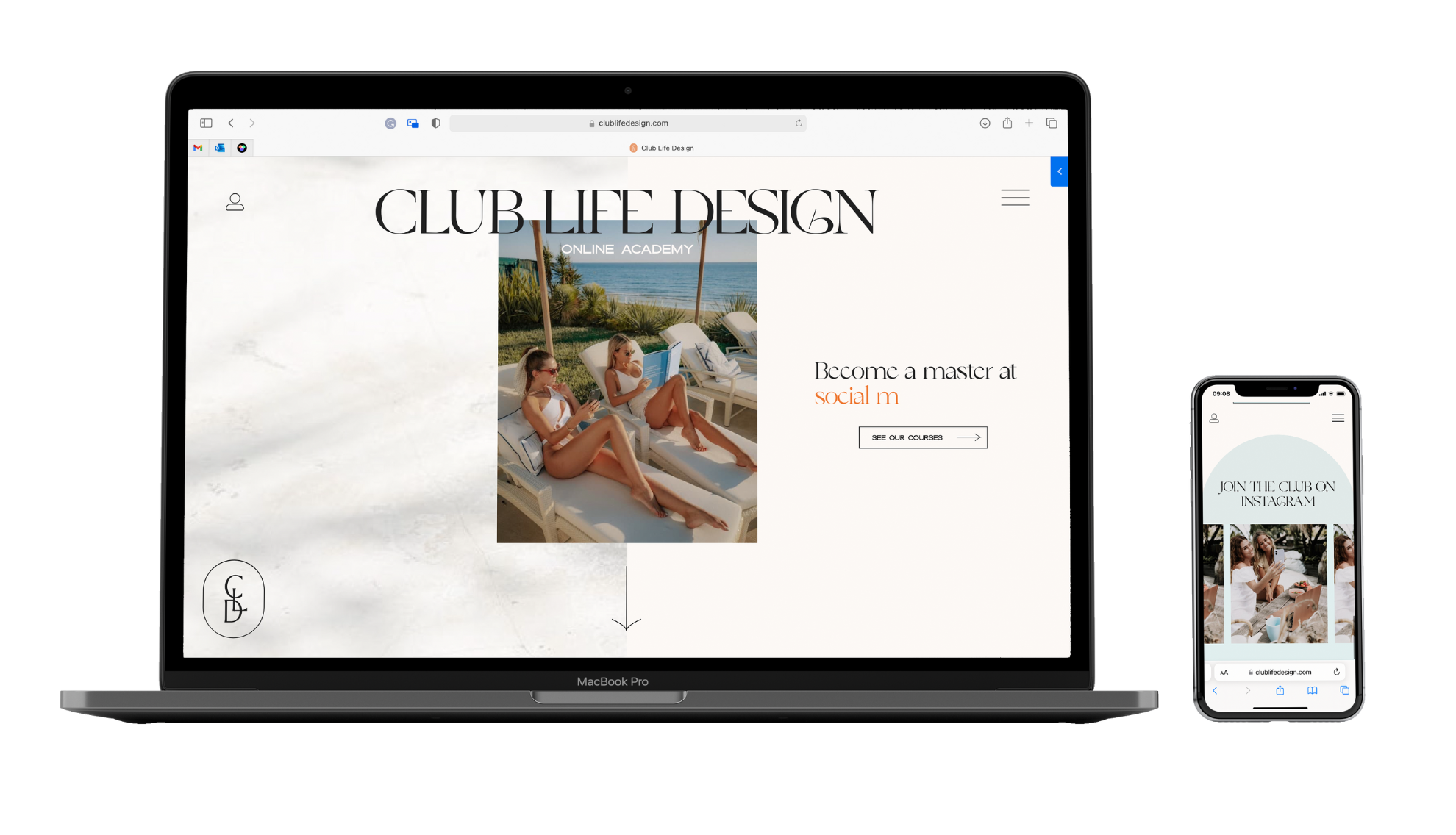
If you own a small business or are planning on starting one, you might have thought about whether or not you need a website. To give you a clear answer to this question: you absolutely do!
Did you know that 62% of customers say that they will stop considering a business if they can’t easily find information about it online? So it’s crucial that you establish an online presence and that includes having a website.
But what does a good business website look like? What are its key elements? Don’t you need to be a coding expert to set up a website that converts?
After building several businesses and a website for each, we have learned a few things and that is exactly what I’ll discuss with you in this blog post! Luckily there are lots of online tools that make it easier than ever to create and launch a website for your small business from scratch. But even though these tools are easy to use, they won’t get you far if you don’t know the key elements that make a successful website. But don’t worry, this doesn’t mean you should hire a professional website designer - you can absolutely do it on your own and I’ll make sure that you have all the tools you need.
Let’s start with the most important pages that you need to include. I’ve also linked an example of our pages for each section so that you can get a clear idea
Homepage
The first page that people will come across when clicking on the link to your website is your Homepage. This is where visitors should find an overview of the different pages that they can access on your website. For example, we started our Club Life Design homepage with our courses, since this is the most important thing for us. After some testimonials from our students (which are great for social proof), we continue with a small about us, and, if anyone clicks on the button underneath they will be led to our ‘About You’ page where they can find more information about us. Then, we move on and give a short overview of our courses separately, again with a button that’ll lead to a designated ‘Sales’ page for each one of the courses. So, as you can see, our homepage is essentially a collection of small summaries of the other pages that people can access through it. Think of it as an executive summary of a business plan or a trailer of a movie or series.
(Find our homepage here: HOMEPAGE)
Product Page
Your Product page should be self-explanatory - here you display all of your products at once. This is especially important if you sell physical products. Show an overview of your different pieces, their names, and prices. For Club Life Design we don’t have a typical Product page, not because it’s not important, but because a Sales page for each product makes more sense for us. We still have a Product page of sorts (which you can find here), but to give you a better example we’ll share the product page of our clothing.
(Find our Product Page here: MIRAH MAJA PRODUCT PAGE)
Sales Page / Landing Page
Your ‘Sales’ or ‘Landing’ page is probably one of the most important pages that you will create for your business, especially if you have digital products, where it makes sense to have a complete page dedicated to just one product (we have a separate Sales page for each of our courses).
Here you turn a visitor into a customer. When you send out emails to your email list, or when you promote something on your social media channels, you will need to be able to lead people to a place where they can actually do what you want them to do: purchase your product or service. In fact, the Sales page is what encourages people to pull out their credit cards.
While there is no one size fits all approach for the perfect Sales page, there are a few core elements of a good sales page that can definitely increase your chances of making more conversions, and those are:
- A build-up of excitement about your product
- A connection and an understanding of your customer’s needs
- Proof that your product or service is amazing
- A promise of a specific problem being solved
If you want to learn more about how to create the perfect sales page, we suggest you read our blog post "What is a Sales Page? And why your Business needs one". And if you are a student of our course “The Freedom Lab” you can check out Chapter 5 in Module 7 - here you will be able to find everything you need to know to build a successful website.
(Find one of our Sales Pages here: SALES PAGE)
About You Page
The name gives it away, your About page should be all about you. Well, it still needs to be about your business, but with an emphasis on the owner, not the products. Information about your products belongs on your Product and Sales pages. On the About You page, people want to learn more about the face behind the brand. What made you start this business? What’s your background? What’s your mission or purpose? You need to make sure that it’s personal but still relevant t your customers. Be personal and add life to your brand but stick to what really matters and write about your business and your journey.
(Find our About You page here: ABOUT YOU)
Blog
The next thing you could add to your business is a section for blog posts. Now, this is not necessary but it can provide your visitors with a lot of free value. If you decide to start a blog it’s important that you share posts relevant to your niche and business. It could be tips on how to use your product, facts on a certain topic in the industry, testimonials, or even success stories from your clients. Just make sure that you are consistent with your posting schedule.
(Find our Blog here: CLD BLOG)
Legal Compliances
Next is a page that might seem a bit scary at first - legal compliances. Now, we are not here to give you any legal advice; ideally, you should get support from an expert or do some more research on it, but your website needs to tick some legal checkboxes. This can include your terms and conditions, a privacy policy, delivery, and returns, and so on
(Find our Terms here: TERMS & PRIVACY)
Contact Page
Lastly, we have your Contact page. Here you can either dedicate an entire page to it with a plug-in that allows your visitors to send you a message directly, or you can simply leave your socials and email address and the bottom of your page so that people can easily find a way to reach out!

Alright, now that you have an idea of the different pages that your business website needs, let’s go over some other elements that are an absolute must:
Represent your aesthetics and branding
The most important thing your website needs to do is represent your brand. And in order to do that, you need to think about your branding and aesthetic. Could you imagine our CLD website in black with neon text and funky pictures? No right? It would look like a completely different business, so it’s crucial that you stick to your colors, fonts, and styles. Your website needs to look like it comes from the same family as your packaging, stationery, Instagram feed, and anything else you’re sharing on behalf of your business.
If you are still struggling with the right branding for your business, we got you - learn about the branding basics that any business needs.
Good copy that converts
One thing that is often overlooked by businesses is good copy. Copy is the words you use to get people to know, like, and trust you. It’s your way to influence others, build your community, and of course, sell your product. You can have the best product on the market, but it won’t matter if your copy isn’t good.
Now, if you have a talent for words you can absolutely write your copy yourself. But if you struggle with it, maybe try to get help from friends or family, or look for a professional on Fiverr (this could also be helpful for your blog posts. You can outsource this task and let someone else write the blogs for your business if you don’t have the time or skills).
Search engine optimization (SEO)
Have you ever heard of SEO? It’s short for Search Engine Optimization, and it is all about optimizing your website to help search engines like Google send customers your way.
People that come across your website without typing in your address or being directed to it through a direct link are known as Organic Traffic. Organic because they came to you organically, usually via a search engine. But how do you get your website to rank high on the search results so that it appears when people search for something related to your business? For example, if you are looking for “Mobile editing courses” and you type that into the search bar, you will see that our CLD courses appear on the first page - that’s because of good SEO.
Now, this is a very big and complex topic, but in order to have a good SEO, you need to provide information, content, and keywords that thoroughly describe your business and products, and formatted it in a way Google can easily understand. If you would like to learn more about the topic, check out our blog post on How to Optimize Your Content For SEO.
Well, there you have it! The 10 most important elements your business website needs to include. Having a great and unique website is fundamental, so no matter what your business is about, you should definitely invest time and effort into it.
And if you know us, you know that we’re all about providing solutions to your problems. Maybe you have heard about it already, but we recently launched The Startup Market. It’s the easiest way to get all of the creative assets you need, to easily start your online business and build a brand that stands out and converts!
Talk soon,

Psst… are you scared to get started? Check out this blog post where we talk about fears that might be keeping you from starting your online business!










